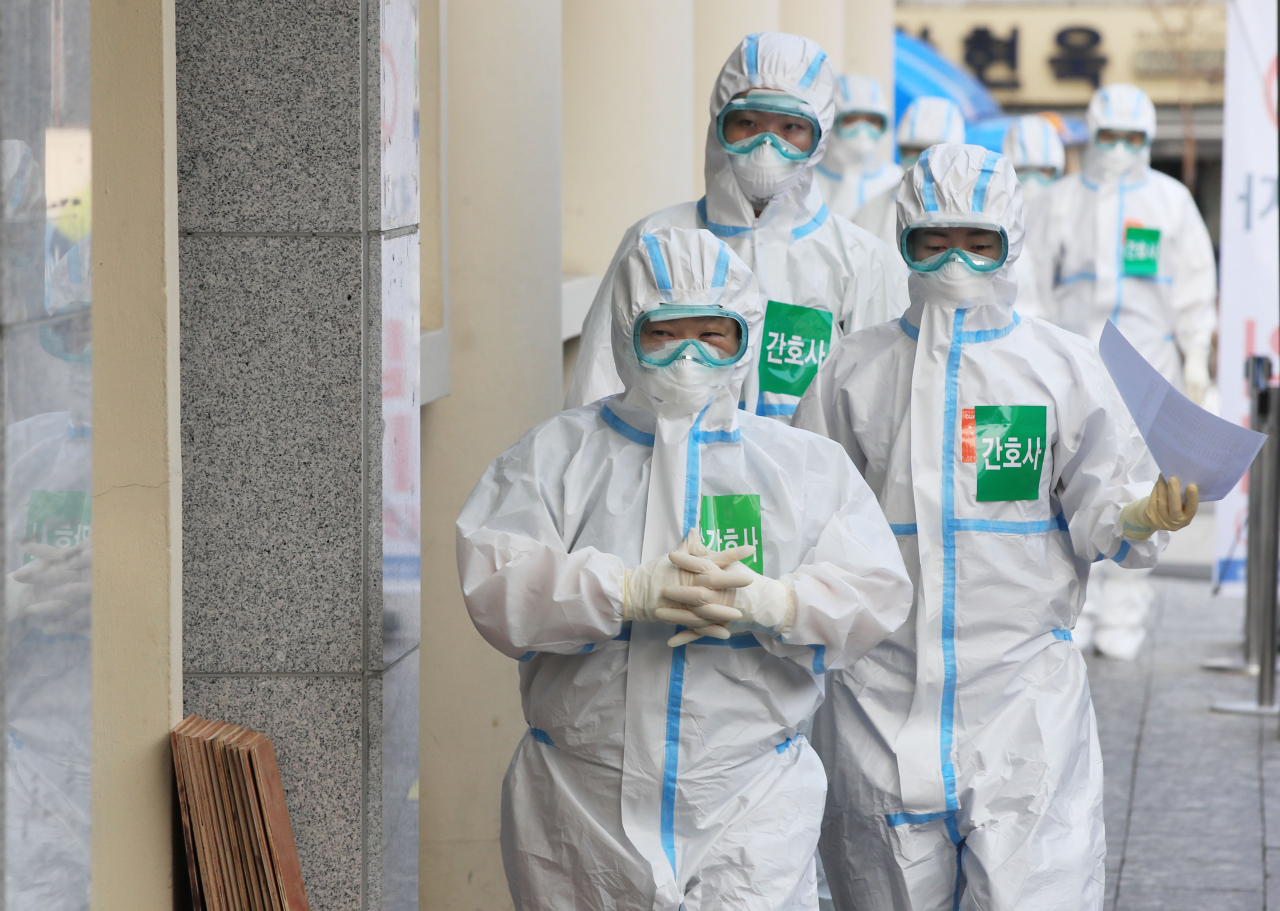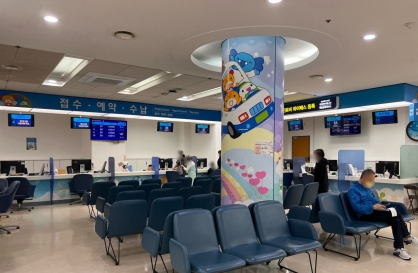S. Korea sees uptick in new virus cases as new clusters pop up
By YonhapPublished : March 19, 2020 - 10:27

South Korea saw an uptick in daily new infections of the novel coronavirus on Thursday, as new clusters of infection continued to pop up in the virus-hit southeastern city of Daegu as well as Seoul and neighboring areas.
The 152 new cases, which were detected Wednesday and reversed four days of double-digit daily new infections, brought the nation‘s total number of infections to 8,565, the Korea Centers for Disease Control and Prevention (KCDC) said.
Wednesday’s number is similar to the 100 or more daily infections reported throughout last week but much lower than the 500 or more daily infections in the first week of this month.
KCDC said that 91 people, mostly elderly patients with underlying illnesses, have died in South Korea from the respiratory virus that emerged in China late last year.
Three more fatalities, all in Daegu and the surrounding area, were reported Thursday, but have yet to be included in KCDC‘s official update.
The KCDC said 59 virus patients are in critical condition. The flu-like virus causes a fever, cough, runny nose and headache for most healthy people, but the risk of severe infection is high for elderly people with underlying health problems.
In South Korea, the virus has preyed on the elderly and already sick people. The KCDC said 71.43 percent of deaths were of people in their 70s and above as of Wednesday. Another 18.68 percent of fatalities were of those in their 60s. No one younger than 29 has been reported to have died.
South Korea’s mortality rate stood at 1.06 percent as of Wednesday, according to the KCDC. For those age 80 and above, the fatality rate was 9.66 percent. For those between the ages 70 and 79, the rate was 6.05 percent. For those between the ages 60 and 69, it was 1.57 percent.
About 60 percent of confirmed cases have been linked to a branch of the Shincheonji religious sect in Daegu, which has a population of 2.5 million and is the country‘s fourth-largest city.
The pace of daily new infections has shown marked signs of slowing since the second week of this month as health authorities completed extensive testing of 210,000 Shincheonji followers at the center of the rapid spread.
But the authorities are still on high alert over new clusters of infections, including at a call center in Seoul‘s Guro district and Protestant churches in Gyeonggi Province.
Of the 152 new cases, 97 are in Daegu and 12 are in North Gyeongsang, the KCDC said. The total number of confirmed cases in Daegu and North Gyeongsang Province, the two epicenters of the virus outbreak here, stood at 6,241 and 1,190, respectively.
Officials in Daegu said 75 new cases have been discovered from a nursing hospital named Hansarang Convalescent Hospital in the city. Another seven cases were detected at five different nursing hospitals in the city, according to Daegu officials.
Three national fencers have tested positive for the virus after participating in a competition in Hungary last week, the Korean Fencing Federation said.
Other major provinces and cities have also reported some infections, with Seoul reporting 12 additional cases.
Seoul, Incheon and Gyeonggi Province, which surrounds Seoul and Incheon, saw their new daily infections rise by 30 to 609 on Wednesday.
Seoul’s confirmed cases rose by 12 to 282, with at least 85 cases linked to the call center in Guro Ward and another 20 cases linked to a Protestant church and an internet cafe in Dongdaemun Ward.
Incheon‘s cases were unchanged at 32, with 19 cases linked to the Guro call center. Gyeonggi Province saw confirmed cases climb by 18 to 295, with 59 cases linked to a church in Seongnam and another 35 cases tied to the Guro call center.
The number of virus cases in Busan was unchanged at 107, with 32 patients linked to a church in the Dongnae district and another eight patients linked to Shincheonji. The 32 patients of the Oncheon church in Busan are connected to the church’s three-day retreat that ended on Feb. 17, officials said. It is still unclear how they were infected with the virus.
In South Chungcheong Province, 103 of the total 118 patients were linked to a Zumba dance class in the provincial city of Cheonan, the KCDC said.
Clusters of infections account for 80.8 percent of the total confirmed cases as of Thursday, meaning that people can contract the virus if they are in a close environment.
A 17-year-old boy without underlying illnesses died of pneumonia on Wednesday in Daegu.
The boy had been tested 13 times, but a sample from his urine tested positive for the virus on the day of his death.
However, KCDC Deputy Director Kwon Jun-wook told reporters that the boy posthumously tested negative for the virus, describing the results of his urine sample test as “undecided.”
Kwon said there was an “error” in testing in a lab at a university hospital and experts confirmed that the lab was contaminated.
With unknown virus sufferers who have not developed symptoms apparently causing significant numbers of infections, the government has called for people to avoid non-essential gatherings in crowded places, such as religious facilities, nursing homes, internet cafes and karaoke rooms.
The world is on a war footing as the virus has killed more than 8,700 and infected more than 210,000 worldwide.
A chartered flight from Iran carrying 80 Korean nationals arrived at Incheon International Airport on Thursday afternoon.
The passengers will be transported to an isolation facility in Seongnam, south of Seoul, to spend about two days undergoing coronavirus tests. If they test negative, they will be asked to self-isolate at their homes.
Yoon Tae-ho, a senior health ministry official who is in charge of containment measures, told reporters that authorities will prioritize “safety and containment” of the 80 people.
Making it harder for health authorities to contain the spread of the virus, the number of imported virus cases rose by five to 16 on Wednesday.
KCDC officials have urged people to delay or cancel nonessential overseas travel. They also called for all overseas returnees to stay home for two weeks and swiftly report to authorities if they show symptoms.
The government is considering requiring all overseas returnees to self-isolate at home, Yoon said.
Yoon said testing has begun for every person at “high-risk facilities” in Daegu, such as nursing homes, hospitals and other long-term care facilities.
Yoon said the government is considering taking “additional measures” to halt the spread of the virus at nursing homes and hospitals because elderly people are very vulnerable to the novel coronavirus.
Yoon renewed calls for people to avoid crowded places, increase personal hygiene and increase social distancing practices to prevent infection.
Since raising the virus alert level to “red,” the highest level, on Feb. 23, health authorities have focused on halting the spread of the virus in Daegu and North Gyeongsang.
On Sunday, the government designated Daegu and three other hard-hit areas in North Gyeongsang as “special disaster zones,” allowing it to subsidize about half of the recovery spending and exempt people there from paying taxes and utility fees.
The World Health Organization declared last week that the global coronavirus crisis is a pandemic as the virus has spread to every continent except Antarctica.
South Korea had released a total of 1,947 fully recovered novel coronavirus patients from hospitals as of Wednesday, up 407 from a day earlier and the biggest one-day release so far, the KCDC said.
The number of daily cured people exceeded the number of daily new infections in South Korea last week for the first time since Jan. 20, when the virus was first detected on South Korean soil.
The number of people being checked for the virus and under quarantine came to 15,904 as of Wednesday, down 442 from the day before, the KCDC said. The country has tested a total of 307,024 suspected cases, with 282,555 testing negative.
The virus is expected to deal an enormous economic blow to South Korea as the global economy is widely expected to slide into a recession and real economic shocks are tightening financial conditions.
President Moon Jae-in pledged 50 trillion won (US$39 billion) in emergency financing for small and medium-sized businesses and other stimulus packages to help shield the nation‘s economy from virus shocks. (Yonhap)





![[Herald Interview] Mom’s Touch seeks to replicate success in Japan](http://res.heraldm.com/phpwas/restmb_idxmake.php?idx=644&simg=/content/image/2024/04/29/20240429050568_0.jpg&u=)



![[News Focus] Lee tells Yoon that he has governed without political dialogue](http://res.heraldm.com/phpwas/restmb_idxmake.php?idx=644&simg=/content/image/2024/04/29/20240429050696_0.jpg&u=20240429210658)









![[Today’s K-pop] Seventeen sets sales record with best-of album](http://res.heraldm.com/phpwas/restmb_idxmake.php?idx=642&simg=/content/image/2024/04/30/20240430050818_0.jpg&u=)